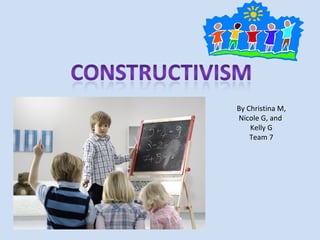Theory team 7
- 1. By Christina M, Nicole G, and Kelly G Team 7
- 2. Constructivism is a learning theory that the learner constructs what he understands. In this theory, children teach themselves by observing and watching others. In school, children take what they have learned and apply it to better understand. As a child grows older, he interacts with different people and has different experiences. The simple acts of interaction with others and forming different views on the world, children are able to gain new skills such as forming abstract thinking.
- 3. Jean Piaget Psychologists who developed the cognitive learning theory. He has four stages in his theory. Jerome Bruner An American psychologist who proposed that learning is an active process where the learner forms ideas as life goes on. Lev Vygotsky A Russian psychologist who believed that learning is influenced by social development. John Dewey An advocate for child-centered instruction. He felt that the best way to learn was to provide relevance to the students life.
- 4. Jean Piaget was a psychologist who believed that children gain knowledge as they go through different stages of life. There are four stages to Piaget’s theory. Each stage provides skills that children in each stage should have. Piaget felt that children use a theory called assimilation that occurs when events in ones life cause a child to gain knowledge by assimilate information with experiences.
- 5. Lev Vgotsky • Russian psychologist who studied the cognitive development in children. • Believes learning takes place within a child’s social development and culture. Students should work collaboratively to share different perspectives. • Proposed the zone of proximal development: the difference between a child’s ability to accomplish a task alone and the potential the child can achieve with a teacher’s help. • Thinks teachers should discover the level of each child’s cognitive development and build their learning experiences from that point. This process is called scaffolding.
- 6. Classroom Implications Teachers should: • Use physical materials and manipulatives • Allow student response to drive lessons • Encourage students to ask questions, and to think about things by asking open ended questions • Encourage students to have conversations with classmates and adults • Nurture a students natural curiosity
- 7. Classroom Implications Students should: • Be willing to learn and practice activities alone and in groups • Share ideas and accept those of others • Allow their ability to accomplish tasks alone to grow by engaging in hands on activities • Accept help from teachers • Use technology to enhance learning experience • Technology will be an imperative instrument in building research skills
- 8. Thoughts Overall I like this theory. I like that the classroom instruction is somewhat determined or altered according to the needs of the students. I feel the students will learn better this way, and that they would also be more eager to learn.
- 9. Credits ATHERTON J S (2010) Learning and Teaching; Constructivism in learning [On- line] UK: Available: http://www.learningandteaching.info/learning/constructivism.htm Accessed: 22 November 2010 Shelly, Cashman, Gunter, & Gunter, . (2009). Integrating technology and digital media in the classroom 6th ed.: teachers discovering computers. Wood, K. C., Smith, H., Grossniklaus, D. (2001). Piaget's Stages of Cognitive Development. In M. Orey (Ed.), Emerging perspectives on learning, teaching, and technology. Retrieved <insert date>, from http://projects.coe.uga.edu/epltt/
- 10. Credits ATHERTON J S (2010) Learning and Teaching; Constructivism in learning [On- line] UK: Available: http://www.learningandteaching.info/learning/constructivism.htm Accessed: 22 November 2010 Shelly, Cashman, Gunter, & Gunter, . (2009). Integrating technology and digital media in the classroom 6th ed.: teachers discovering computers. Wood, K. C., Smith, H., Grossniklaus, D. (2001). Piaget's Stages of Cognitive Development. In M. Orey (Ed.), Emerging perspectives on learning, teaching, and technology. Retrieved <insert date>, from http://projects.coe.uga.edu/epltt/

